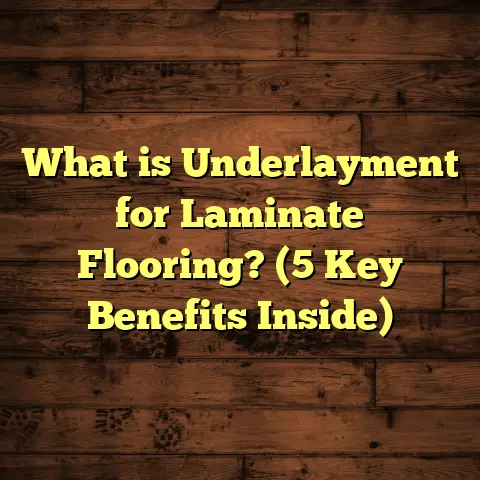What is the Most Durable Flooring Tile? (5 Types for Your Home)
I used to think all flooring tiles were pretty much the same when it came to durability. You know, I believed that if a tile looked good and felt solid, it would last forever. Over time, after installing floors in dozens of homes and seeing firsthand how different materials hold up, I realized that durability isn’t just about appearances or price. Some tiles that look delicate can stand up to years of abuse, while others that seem tough can fail sooner than you’d expect.
So I started digging deeper: what really makes a flooring tile durable? And which ones are best if you want a floor that lasts decades without losing its charm?
If you’re like me and want to make a smart choice for your home—whether it’s a busy kitchen, a muddy entryway, or a cozy bathroom—this article is for you. I’m going to walk you through what durable flooring tile means, share my own experiences and lessons learned, and take a close look at five types of flooring tile that stand out for their toughness and longevity.
What Is Durable Flooring Tile?
Durable flooring tile means it can withstand the daily grind without cracking, chipping, scratching, or fading. It should resist moisture, stains, temperature shifts, and heavy foot traffic. In other words, durable tiles keep their look and function over time—even in the busiest parts of your home.
But durability doesn’t come from just one thing. It depends on:
- Material composition: What the tile is made of matters a lot.
- Manufacturing process: How the tile is made affects strength.
- Finishes or coatings: These can protect or weaken the surface.
- Installation quality: A well-installed tile has a better chance of lasting.
- Maintenance: Proper care extends life span.
In my experience as a flooring contractor, I’ve seen that matching tile type with its intended use is critical. For example, porcelain tiles work great in kitchens because they handle spills and traffic well. On the other hand, natural stone can be beautiful but needs sealing to avoid stains.
When clients ask me what tile lasts longest, I don’t just think about hardness or scratch resistance—I consider how the tile performs day-to-day in real homes with kids, pets, heavy shoes, and all kinds of messes.
Why Does Durability Matter So Much?
Think about your floor. It’s walked on every day—sometimes hundreds of steps a day. It gets dropped-on with heavy objects, exposed to moisture in kitchens and bathrooms, and suffers from sunlight fading near windows.
If your tile can’t hold up against all this, you’ll be staring at cracks or stains within a few years. That means costly repairs or replacement.
From my years installing floors, I’ve learned durability isn’t just about avoiding damage. It’s about keeping your home beautiful and comfortable without stress about wear and tear.
My Journey with Flooring Tiles
I remember early in my career installing cheap ceramic tiles for a client who was on a tight budget. At first, everything looked great. But within two years, several tiles cracked near the doorway due to foot traffic and moisture exposure. The client was frustrated. That’s when I started paying closer attention to which tiles truly last.
Later on, I installed porcelain tiles for another family’s kitchen renovation. Their kids are pretty active—dropped toys, spilled drinks, muddy boots—you name it. Five years later? The floor looks nearly brand new. No chips, no stains.
Those experiences taught me that not all tiles are created equal—and picking the right tile takes more than just price or look.
Let’s Get Into the Five Most Durable Flooring Tile Types
I’m going to break down each type by what it’s made of, why it’s tough, where it’s best used, plus some personal stories and data to back things up.
1. Porcelain Tile: The Heavyweight Champion
Porcelain tile tops my list for durability every time. It’s made from very fine clay and minerals fired at ultra-high temperatures—usually over 2,300°F (1,260°C). This intense firing creates a super dense tile that absorbs almost no water.
Why Porcelain Tiles Rock
- Water absorption rate under 0.5% — This tiny number means water barely seeps in at all.
- Hardness: Porcelain scores around 7 on the Mohs scale (which measures scratch resistance).
- Impact resistance: It can handle dropped objects without cracking.
- Stain resistance: The dense surface prevents most stains from penetrating.
- Glazed or unglazed options: Glazed porcelain has an extra layer of protection; unglazed offers a natural look with slip resistance.
Where I Use Porcelain Tiles
I recommend porcelain for kitchens, bathrooms, entryways—basically anywhere heavy use meets moisture risk.
In one project, a client’s kitchen floor gets daily abuse from kids dropping sharp utensils and liquids everywhere. After more than five years, their floor still looks flawless because porcelain’s density resists chips and stains.
Data to Back It Up
According to industry lab tests:
- Porcelain tile has an average lifespan exceeding 50 years.
- It scores highest for resistance to abrasion and impact compared to ceramic or vinyl.
- Porcelain is also fireproof and freeze-resistant—great for outdoor patios in cold climates.
2. Natural Stone Tile: Timeless Strength
Natural stone has been used as floor material for thousands of years—and for good reason. Tiles like granite, slate, marble, and quartzite offer unmatched natural beauty combined with strong durability.
But not all stone is equal when it comes to toughness.
Which Stone Tiles Last Longest?
- Granite: Hardness of 6-7 on Mohs scale; very scratch-resistant.
- Quartzite: Even harder—up to 7-8 Mohs; excellent wear resistance.
- Slate: Dense and moisture-resistant but can chip if thin.
- Marble: Beautiful but softer (3-5 Mohs) and more prone to scratches/stains—needs sealing often.
Personal Experience with Stone
I once helped a client choose stone for their mudroom floor—a high-traffic area with lots of wet shoes and boots. Slate was tempting because of its rustic look but granite’s superior hardness won me over. After three years of daily foot traffic and winter salt stains, the granite still looks amazing.
Stone requires sealing to prevent stains and moisture damage. Clients sometimes get frustrated with maintenance—but I always stress how proper care protects their investment.
Research Insight
The Natural Stone Institute conducted wear tests showing granite tiles maintain integrity even after thousands of cycles of simulated foot traffic without visible wear or cracking.
3. Ceramic Tile: Budget-Friendly Durability
Ceramic tile often gets lumped in with porcelain but it’s quite different. Made from clay fired at lower temperatures (around 1,800°F), ceramic is less dense and generally absorbs more water (3-7%).
That means ceramic isn’t as tough as porcelain but still has solid durability when you pick quality products.
Where Ceramic Works Best
Ceramic tiles are often glazed—which adds stain resistance—but they’re more prone to chipping or cracking under impact than porcelain.
That said:
- Ceramic is great for bathrooms where traffic is lighter.
- Often used on walls or backsplashes.
- Budget-friendly option for moderate use areas.
My Take on Ceramic Floors
I’ve installed ceramic floors in guest bathrooms where moisture is controlled but foot traffic is light. With good grout sealing and gentle cleaning products, these floors last 10+ years without major issues.
Numbers That Matter
Industry reports show:
- Higher-end ceramic tiles last about 15-20 years in residential use.
- Lower-grade ceramic may only last 5-10 years before damage appears.
Choosing thicker tiles with solid glaze improves durability significantly.
4. Vinyl Tile: Modern Durability with Flexibility
Vinyl might surprise you on this list since it’s synthetic—not stone or fired clay—but it offers impressive durability especially where moisture is a concern.
What Makes Vinyl Tough?
Vinyl tiles (especially luxury vinyl tile or LVT) are built up from layers of PVC with a protective wear layer on top:
- Wear layers range from 12 mils (moderate use) to 20+ mils (heavy use).
- Totally waterproof surface—no worries about spills or humidity.
- Flexible material resists cracking by absorbing impact.
- Resists stains and fading from sunlight.
Why I Like Vinyl for Busy Homes
In rental properties or basements where moisture is high and tenants can be rough on floors, vinyl saves me headaches often. It installs quickly over many subfloors (even concrete), doesn’t crack like ceramic can, and cleans up easily.
I installed LVT in a teenager’s bedroom where athletic gear and muddy shoes are common—and no damage after three years.
Industry Stats
Data from the Floor Covering Industry Association shows luxury vinyl floors last 15-25 years under typical residential conditions with proper installation and care.
5. Quarry Tile: Industrial Toughness for Your Home
Quarry tile is an unglazed ceramic tile made from natural clays fired at high temperatures—originally designed for commercial kitchens and factory floors. Its reputation for toughness translates well into residential spaces needing rugged flooring.
What Makes Quarry Tile Durable?
- Thicker and harder than standard ceramic.
- High abrasion resistance.
- Porous surface requires sealing but provides natural slip resistance.
- Can withstand heavy rolling loads and impacts.
My Experience with Quarry Tile
I installed quarry tile in a client’s sunroom turned pet room—it stands up well to claws and dirt tracked in from outside. After several years of wear, the floor remains intact with only occasional resealing needed.
Case Study
A commercial kitchen study found quarry tiles survived thousands of heavy load cycles without cracking or surface damage—proof they’re ready for tough environments.
What About Other Tiles? Why Not Mention Them?
You might wonder about other materials like glass tile or cement tile. While these can be beautiful choices for certain looks or accents, they don’t rank as durable flooring options for high-traffic areas because glass chips easily and cement tile can stain without sealing.
How Do You Pick the Most Durable Tile for Your Home?
There’s no one-size-fits-all answer here because durability depends on your lifestyle and where you want the tile installed.
Ask yourself:
- What room am I tiling? Kitchen? Bathroom? Entryway?
- How much foot traffic does that room get?
- What kind of spills or moisture exposure happens there?
- Do I have pets or kids who may cause more wear?
- What’s my budget?
- How much maintenance am I willing to do?
If you want my personal recommendation based on years of experience:
Porcelain is almost always the safest bet for long-lasting beauty under heavy use.
Natural stone works well if you love natural textures but expect to invest in sealing and care.
Ceramic fits well in light-use rooms on a budget but won’t take heavy abuse.
Vinyl surprises many by lasting long in wet or high-impact areas with minimal fuss.
Quarry tile is perfect if you want industrial-level toughness in certain spaces like mudrooms or sunrooms.
Installation Matters More Than You Think
Even the toughest tile won’t perform well if installed poorly. Subfloor preparation is critical—uneven surfaces cause cracking. Proper grout sealing prevents water damage.
I always tell clients: invest in professional installation if possible—it pays off with fewer problems down the road.
Tips for Keeping Your Durable Tile Looking Great
No matter which durable tile you choose:
- Sweep/vacuum regularly to remove dirt that could scratch surfaces.
- Clean spills quickly to avoid stains—especially on porous stones.
- Use manufacturer-recommended cleaners.
- Seal stone/quarry tiles every couple of years.
- Avoid dragging heavy furniture across floors.
These simple steps have saved many of my clients from premature wear—and kept their floors looking new longer than expected.
What Does All This Mean For Your Flooring Project?
Durable flooring tile isn’t just about buying the “hardest” material—it’s about matching your home’s needs with the right material’s strengths.
Over hundreds of projects across different homes—from urban apartments to country houses—I’ve seen how durability depends on choosing wisely plus good installation and care.
If you want a floor that really stands up to life’s messes—kids running wild, pets scratching at doors, spills everywhere—start by considering one of these five durable types:
- Porcelain for ultimate toughness
- Natural stone for timeless strength
- Ceramic for budget-conscious style
- Vinyl for waterproof flexibility
- Quarry tile for industrial grit
Final Personal Thoughts
Looking back on my flooring career so far, I think what surprises most homeowners is how much difference material choice makes—not just price or looks. When you pick durable flooring tile suited for your lifestyle and environment—and install it right—you really can enjoy beautiful floors that last decades without stress or costly repairs.
If you have questions about your specific space or want advice on which durable tile fits your needs best, just ask me anytime—I’m happy to share my knowledge drawn from real-world experience!





